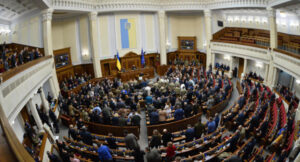
The Verkhovna Rada has ratified the Rome Statute of the International Criminal Court.
The corresponding bill No. 0285 on the ratification of the Rome Statute of the International Criminal Court and amendments to it as a whole was voted for by 281 MPs at the plenary session of the Verkhovna Rada on Wednesday, Oleksiy Honcharenko, a member of the European Solidarity faction, said in a Telegram message on Wednesday.
Ukraine ratified the Rome Statute with declarations on the procedure for relations with the ICC and for seven years after the Rome Statute enters into force “does not recognize the jurisdiction of the International Criminal Court over its citizens for crimes under Article 8 of the Rome Statute” (war crimes).
The draft law confirms Ukraine’s recognition of the ICC’s jurisdiction over crimes against humanity, genocide and war crimes since November 21, 2013, and declares recognition of the ICC’s jurisdiction over the crime of aggression since July 17, 2018 (the date of entry into force of the amendments adopted by the Assembly of States Parties to the Rome Statute in Kampala on the crime of aggression).
As noted in the explanatory note to the draft law, ratification of the Rome Statute will allow Ukraine to become a full member of the International Criminal Court. After the Rome Statute enters into force, Ukraine will participate in the work of the Assembly of States Parties to the Rome Statute and will be able to submit candidates for the election of judges and prosecutors to the ICC. Membership in the Rome Statute will help prevent and deter the commission of particularly serious crimes in the future. Ukraine will be able to effectively cooperate with the ICC, which will help ensure that those responsible for particularly serious crimes that are of concern to the international community are punished.

The British people will go to the polls on Thursday to determine the new composition of the Parliament. Polling stations will be open from 07:00 to 22:00 local time (09:00 to 00:00 CET). The British parliament is elected for five years and one party needs to win 326 seats out of 650 for a majority.
The first preliminary results are expected around 23:30 (01:30 CET), and updated data is expected to be published between 03:00 and 05:00 (05:00 and 07:00 CET). Western media note that it is usually after the publication of such updated information on the voting results that the leader of the losing party concedes defeat.
On Friday morning, the leader of the winning party is expected to travel to Buckingham Palace to inform King Charles III that he is ready to form a government.
The pre-election polls were extremely unfavorable for the Conservatives: according to several media outlets that compiled polls from various opinion companies, Labor could get about 40% of the vote, the Conservatives about 20%, and the Reform the UK party about 16%.
At the same time, experts from Survation said that they can say with 99% confidence that Labor will win with a huge margin. According to their latest poll, given the current rules for distributing votes in the election, the Labor Party could win 484 seats out of 650 (about 75% of the seats). In this scenario, the Conservative Party would receive only 64 seats (about 10%), which could be the worst result in their history.
Thus, the Reform the UK party, headed by Nigel Farage, may, under a favorable set of circumstances, overtake the Conservatives in the elections and become the second most important political party in the country. Farage’s party is mainly focused on immigration and the continuation of Brexit.
At the same time, changes are expected from Scotland and Northern Ireland. The Scottish National Party (SNP), which is experiencing an internal crisis, may lose some seats in the British Parliament to Labor. At the same time, the left-wing nationalist party Sinn Fein may win the majority of seats in the parliament for the first time in history from Northern Ireland. The party adheres to the policy of abstentionism, which means that if it wins, it will not de facto take its seats.
Pre-election polls in Wales do not predict any radical changes.
According to British voters, the most important problems in the kingdom are currently the economic situation (about 52% said so), the healthcare situation (50%), and immigration and asylum issues (40%). At the same time, the British media note that in their election promises, both Labor and the Conservatives do not pay enough attention to the country’s main problems.
Labor leader Keir Starmer promises to reform several sectors, including the National Health Service, and to raise taxes to invest in these areas. The leader of the Conservatives, Prime Minister Rishi Sunak, promises to cut taxes.
At the same time, the positions of the two parties on Russia’s full-scale war against Ukraine do not differ much: Sunak promised to stand by Ukraine “no matter what it takes,” while Starmer repeatedly said that his support for Kyiv is “ironclad.” The Labor Party’s manifesto states that it is ready to work with the Ukrainian government to diplomatically isolate Russia and increase industrial production. Labor is also ready to work to create a path to Ukraine’s membership in NATO.
At the same time, Farage said that Russia and Ukraine should try to organize a negotiation process by using mediators. He criticized NATO’s eastward expansion and said that Ukraine, in his opinion, should act as a buffer state between Russia and the West in the future.
Political problems for the Conservative Party began at the end of 2021, when Boris Johnson, who was then Prime Minister, resigned due to his participation in parties during the COVID-19 lockdown and the scandals that followed. Liz Truss took over as prime minister in September 2022 and was replaced by Sunak in October. The Conservative Party has been in power in the UK for about 14 years.
In late May, Sunak announced his intention to hold general elections on July 4, a decision that came as a surprise to many. The previous parliament convened in December 2019, so the prime minister had until December to decide.
Earlier, Experts Club presented an analytical material on the most important elections in the world in 2024, a more detailed video analysis is available here – https://youtu.be/73DB0GbJy4M?si=eGb95W02MgF6KzXU
You can subscribe to the Experts Club YouTube channel here – https://www.youtube.com/@ExpertsClub

French President Emmanuel Macron announced the dissolution of the National Assembly and the scheduling of early parliamentary elections for June 30 and July 7, French newspaper Le Figaro reported.
“I have decided to give you back the choice of your parliamentary future. It is a serious and weighty decision, but above all, it is an act of trust,” Macron said in a video message posted on social network X.
The first round of elections will be held on June 30, with the second round on July 7.
Macron’s list was defeated in the European Parliament elections, taking half as many as the right-wing National Union.
According to Macron, this result “is not a good result for parties defending Europe.” He added that the far-right was gaining popularity everywhere on the continent.
“I cannot act as if nothing has happened….. That is why, having carried out the consultations required by Article 12 of our Constitution, I have decided to once again give you the choice of our parliamentary future by voting. In a few minutes, I will sign a decree calling parliamentary elections to be held on June 30, the first round, and July 7, the second round,” the French leader said.

Verkhovna Rada Speaker Ruslan Stefanchuk has signed a decree on the admission of journalists to the parliament building under martial law.
According to the press service of the Verkhovna Rada, the decree allows media representatives to cover the activities of parliament directly in the premises of the legislative body.
The order approves the regulation “On accreditation of media at the Verkhovna Rada of Ukraine of the ninth convocation for the period of martial law in Ukraine”.
Stefanchuk and the head of the parliamentary staff Vyacheslav Shtuchny met with journalists and informed them about the peculiarities of media work in the press center of the Verkhovna Rada, in particular, about actions during the announcement of an air alert. The media representatives were shown the simplest shelter of the parliament building, where they will be obliged to go down during an air alert.
Stefanchuk said that despite the restrictions during martial law, it is important for journalists to be able to cover the activities of the legislative body. He also informed that given the need to comply with security requirements, a maximum of 30 people can work in the press center.

A Swiss parliamentary committee voted late on Thursday night in favor of allocating 5 billion Swiss francs ($5.5 billion) in aid to Ukraine, Reuters reports.
“A Swiss parliamentary committee voted late on Thursday night to allocate 5 billion Swiss francs ($5.5 billion) in aid to Ukraine as part of a broader package aimed at boosting the defense capabilities of neutral Switzerland. Backed by lawmakers from center-left and center-right parties, the upper house’s security committee approved the package, which provides 10.1 billion francs in additional funds for the army, along with the amount for Ukraine,” it said.
The plan was adopted by 8 votes to 5, with right-wing parties opposed. It is noted that it will have to pass a number of parliamentary hurdles before the plan becomes law.
“The parliament statement said the multi-billion dollar package was conceived as an extraordinary contribution to Swiss security and ‘peace in Europe’ in the wake of the war Russia is waging against Ukraine,” the statement said.
The parliament also said that the Ukrainian part of the package is aimed at supporting the reconstruction and repair ofeveryday infrastructure necessary for life in Ukraine.

The Verkhovna Rada has amended the Criminal and Criminal Procedure Codes of Ukraine to criminalize smuggling of goods and excisable goods, which is one of the conditions for the last tranche of the EU’s EUR 1.5 billion macro-financial assistance to Ukraine.
According to MP Yaroslav Zheleznyak (Holos faction), the committee’s version of the draft law was adopted, which was amended in accordance with the letters from the Ministry of Finance that the business insisted on.
“1) It is proposed to raise the thresholds for smuggling 5 times. 2) The thresholds for excisable goods are to be raised by 2 times. 3) The entry into force (criminalization) of commodity smuggling is postponed until mid-2024. As I said, this is the deadline under the (memorandum with the) IMF on the BES reboot,” the MP listed the changes.
He added that the numerous wishes of the business community have also been taken into account, and that actions can only be classified as a crime if there is intent.
“Possible cases of prosecution under ‘smuggling’ articles for submitting documents with false information have been significantly limited – in the amended version, they must be the basis for the movement of goods, be subject to mandatory declaration under customs law, and have an impact on determining the amount of customs payments or compliance with non-tariff regulation measures,” Zheleznyak said.
During the voting, no amendments were made to the text submitted by the committee to the Rada for the second reading, but the text itself is not yet available on the parliament’s website.
According to the representative of the relevant committee, Oleksandr Bakumov (Servant of the People), the threshold for criminal liability for smuggling is set at UAH 6.71 million, which is 50 times higher than in the draft law adopted as a basis (UAH 113.5 thousand – IF-U). He added that the threshold for smuggling excisable goods (except for electricity) has been increased by “thirty-three and three and a half times” compared to the original draft (UAH 56.75 thousand).
Members of the European Solidarity and Batkivshchyna parties, who criticized the draft law, called the main problems of the law the presence of law enforcement agencies in the customs control zone with the addition of the Bureau of Economic Security (BES) and the unresolved problems that led to the adoption of the law on smuggling decriminalization in 2011.
“Ukraine is the only country in Europe and in the World Customs Organization whose customs authorities are not vested with pre-trial investigation functions… We could have left only what is transported outside the customs posts to be considered smuggling,” says MP Nina Yuzhanina (European Union). According to the current legislation, only the illegal transportation of cultural property, poisonous, potent, explosive substances, radioactive materials, weapons or ammunition, parts of firearms, as well as special technical means of covertly obtaining information is considered smuggling.